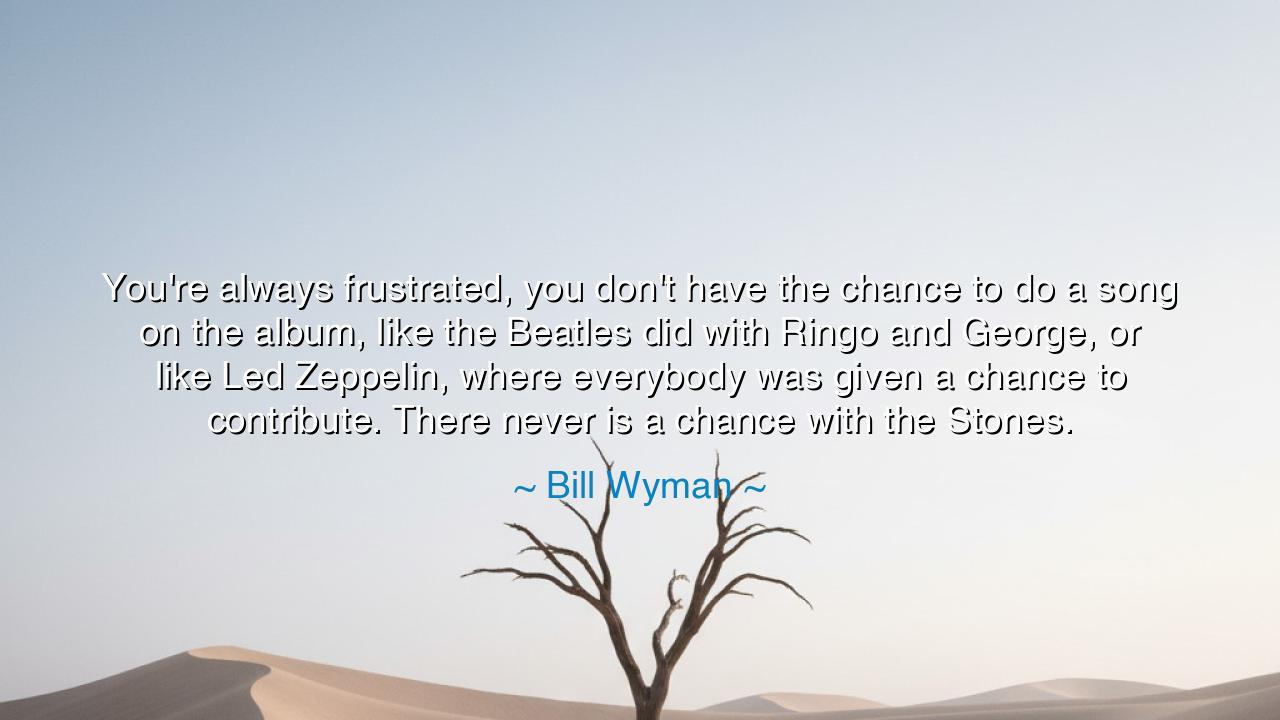
You're always frustrated, you don't have the chance to do a song
You're always frustrated, you don't have the chance to do a song on the album, like the Beatles did with Ringo and George, or like Led Zeppelin, where everybody was given a chance to contribute. There never is a chance with the Stones.






"You're always frustrated, you don't have the chance to do a song on the album, like the Beatles did with Ringo and George, or like Led Zeppelin, where everybody was given a chance to contribute. There never is a chance with the Stones." These words spoken by Bill Wyman, the bassist for the legendary Rolling Stones, speak not just to the dynamics of a rock band, but to the deeper nature of creativity, contribution, and the complex relationships within any collective endeavor. Wyman’s frustration is a universal feeling—one that resonates with all who have ever worked within a group, yet felt their voices were stifled, their talents unrecognized. In this brief reflection, Wyman touches on the essence of collaboration, the yearning for one’s ideas to be given space to flourish, and the tension that arises when one’s creative spirit is held back.
The very heart of creativity lies in expression—the sharing of one’s inner world with the collective. When we look to the Beatles, we see a group where each member had the opportunity to share their vision. While John Lennon and Paul McCartney were often seen as the driving forces of the band’s success, both Ringo Starr and George Harrison found opportunities to contribute their own songs to albums, offering unique perspectives and showcasing their individual artistry. This sense of equity in contribution is part of what made the Beatles so special: a harmonious balance between collaboration and individuality. Ringo’s “Octopus’s Garden” and George’s “Here Comes the Sun” stand as testaments to the fact that, even within the collective genius of the Beatles, every member’s voice had room to shine.
Yet, Wyman’s words reflect a different reality. The Rolling Stones, for all their glory, did not offer the same creative freedom to every band member. Mick Jagger and Keith Richards held a dominant position in the songwriting process, often leaving Wyman, Charlie Watts, and the others with little room to contribute their own songs to the band’s albums. This lack of opportunity for individual expression within the group led to frustration. Wyman’s comment reveals how the structure of power within a band, or any collective, can deeply impact the sense of personal fulfillment and creativity. When one is silenced or marginalized in a creative environment, the energy that fuels both the individual and the group begins to wane.
This frustration is not unique to rock bands, but can be seen throughout history in many collective endeavors. The great philosophers of ancient Greece, for instance, often worked within tight-knit circles, with individuals like Socrates or Plato sometimes overshadowing others in their discussions. Yet, there were also those voices that, though often unheard, left their imprint on history. Aristotle, a student of Plato, eventually grew to challenge many of his teacher's ideas, contributing greatly to science and ethics. The struggle for individuality within a group dynamic is as old as human civilization itself. Creativity thrives best in an environment where all voices are valued, not just the loudest or the most dominant.
Consider the story of Michelangelo, whose work under the patronage of the Medici family and Pope Julius II was a great artistic feat. Yet, Michelangelo’s frustrations with patronage and the overwhelming control placed upon him by powerful figures were not insignificant. Though he had the opportunity to create masterpieces like the Sistine Chapel ceiling, he often clashed with those who sought to impose their own vision upon his work. Despite his undeniable genius, he yearned for more freedom in his artistic expression. Like Wyman, Michelangelo found himself in a position where the politics of creation left him feeling constrained, even when he had the skills and vision to go beyond what was asked of him.
The lesson in Wyman’s words is one of empowerment—the importance of allowing everyone to contribute, to have their voices heard, and to share in the creative process. In any group, whether it is a band, a family, or a workplace, the greatness of the collective depends on the ability of each member to bring their individual strengths to the table. When a person feels their contributions are overlooked or dismissed, their passion and drive begin to diminish. To truly achieve greatness, a group must create a space where every member has the opportunity to share, to shine, and to grow. Inclusivity in the creative process does not diminish the strength of the group—it enhances it, weaving together diverse talents and perspectives into a greater whole.
Therefore, let us take Wyman’s words to heart. In our own lives, whether in work, creativity, or collaboration, we must ensure that every voice is valued and given the space to flourish. We must seek to break down the walls of hierarchy that stifle creativity, and instead foster an environment where all members feel that they can contribute without fear of being silenced. In doing so, we unlock the true power of collaboration—creating something far greater than any single individual could achieve on their own. When we give each person the opportunity to express their unique talents, we pave the way for innovation, growth, and fulfillment.
And so, as we work together, let us remember that the key to success lies not in the dominance of one, but in the unity of many. Just as the great bands of history flourished when each member contributed their gifts, so too will our collective efforts soar when we embrace the full potential of every individual.






AAdministratorAdministrator
Welcome, honored guests. Please leave a comment, we will respond soon